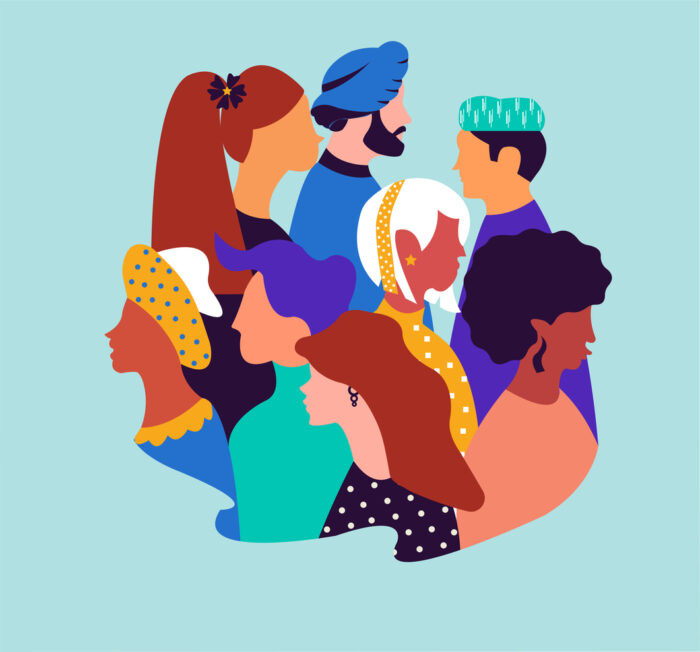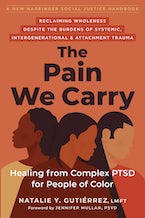By Natalie Y. Gutiérrez, LMFT, author of The Pain We Carry
How do we heal from the historical trauma living in our lineage? How do we even grasp what healing looks like in today’s world, full of cultural burdens that plague our communities and spirit? These cultural burdens have woven themselves into how we experience the world and how we see ourselves—and it can have us feeling hopelessness and despair.
For many years Black, Indigenous, and People of Color struggled with anxiety, sadness, and a sense of loss and disconnection within themselves. Building on this sense of loss and marginalization was the psychology literature that lacked the representation in case studies, and did not include the unique struggles of marginalized identities. For such a long time, Black and Brown bodies have not been part of the conversation of how post-traumatic stress and complex post-traumatic stress is experienced through systemic oppression and structural racism. There have been few spaces for folks to explore and understand the cultural and legacy burdens they’re carrying, and how these burdens have created mental health struggles and disease in our bodies—often passed down throughout generations.
And while I’ve tried to address symptoms of anxiety, depression, and shame with my Black and Brown clients—some of these layers of pain still remained. They were deep, and felt centuries old. The impacts of present-day external constraints—like immigration status, disability, systemic racism, and oppression—weighed heavily on their spirits and interrupted their quality of life. Achieving joy, rest, and happiness seemed more like a privilege than a right.
Mental health literature and graduate programs only provided us the tools to address psychological symptoms—without understanding the deep-rooted pain these symptoms emerged from. I’ve often asked my clients: What’s your story? And: What’s the story before your story? How old is the pain you carry? Most often, this pain has been around for a long time, but they haven’t known the words to describe them. And, they’ve also seen this pain in their families too. Sometimes unspoken pain is buried down in families that avoid speaking about emotions to survive and work hard to exile them. Consequently, we become so unfamiliar at navigating conflict, feeling our feelings, and speaking for them, that it creates further disconnection—when all we really want is close relationships and connection. This is a prime example of how coping adaptations are learned and passed down intergenerationally. They serve their purpose when we need them, but eventually need updating and healing. Coping and healing aren’t the same.
Coping is meant to be temporary in times of distress, and this is when our tools for distress tolerance and emotion regulation come in handy. And, these same coping mechanisms are just Band-Aids if we’re not looking at the root of the issue. I’ve found that as we excavate these issues, at their root are societal and cultural burdens, and wounding from historical trauma.
All this time, we’ve falsely learned that psychology and activism/political issues must be separated. Yet, both my lived experience and professional practice has informed a different lens—they must be integrated because they come together. If our larger culture is designed to harm Communities of Color and other marginalized identities—these communities will continue to be burdened by the larger systems, creating more complex trauma. We will continue to just teach and expect Black, Indigenous, and People of Color to cope, not to heal. We need to move toward learning what true liberation looks like—both within ourselves and in the systems and institutions that we participate in. In my book, I ask the reader: “What does your liberation look like?” I ask this because so many people cannot envision what liberation looks like as they’re carrying cultural legacy burdens of racism and oppression. And slowly, at our own pace, I want to offer the invitation to release these burdens in the ways that feel most organic to us so that we may finally relish in our joy and inner peace.
That is my deepest wish for you.
Natalie Y. Gutiérrez, LMFT, is a licensed marriage and family therapist, and founder of Mindful Journeys Marriage & Family Therapy. She works primarily with BIPOC (Black, Indigenous, People of Color) survivors of complex trauma.



 2024 Peace Playbook: 3 Tactics to Avoid Clashes with Your Partner
2024 Peace Playbook: 3 Tactics to Avoid Clashes with Your Partner